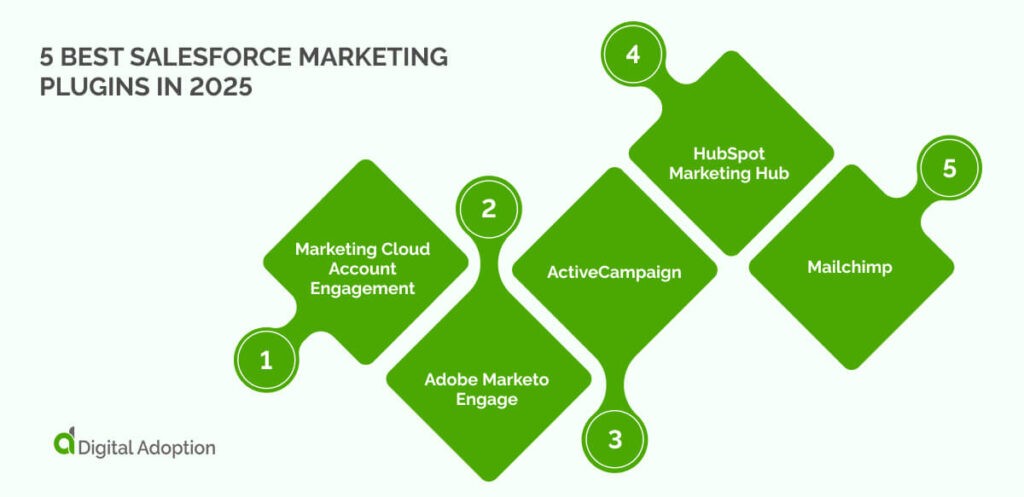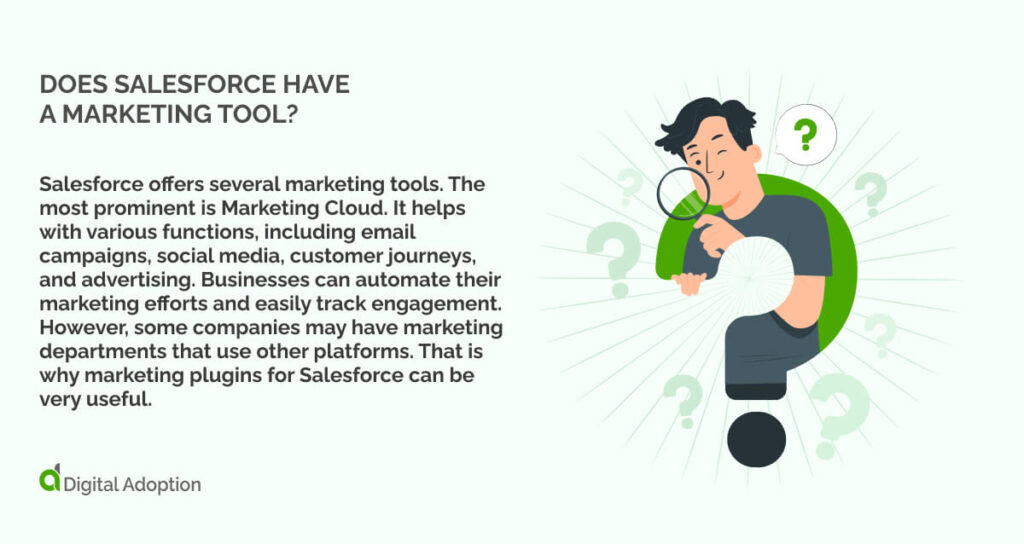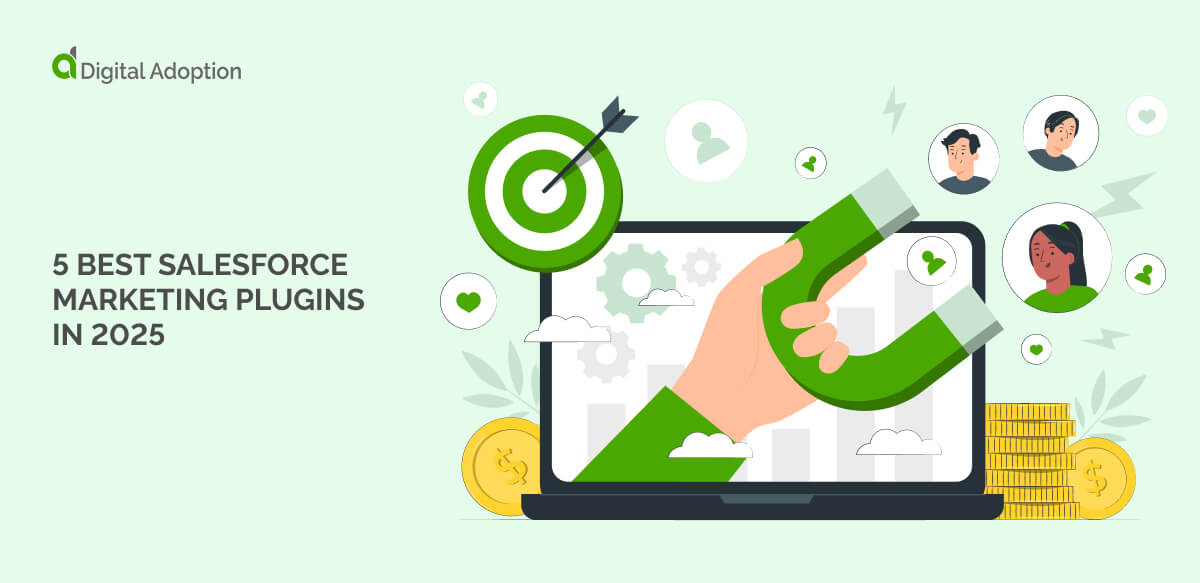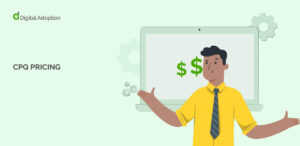Marketing teams that use Salesforce alongside other digital tools will benefit from plugins that optimize their workflow. If they are tracking activities on a different platform, they may not be able to share pipelines with the sales department effectively. This can create common CRM challenges that stop teams from working together.
Fortunately, Salesforce offers plugins for the most popular marketing platforms, from HubSpot to Mailchimp, which can significantly improve Salesforce adoption across marketing teams.
Use cases can vary hugely. For example, small teams may use Salesforce activity to trigger emails. Elsewhere, enterprises can sync data to Salesforce pipelines.
Below, we outline the most popular marketing plugins that allow teams to sync with Salesforce. After a small amount of upfront work to connect your tech stack, managing workflows will become much easier.

At-a-glance comparison
| Tool | Best for | Pricing | Native/third party |
| Marketing Cloud Account Engagement | B2B teams using Salesforce to align sales and marketing automation | From $1,250 / company/month | Native |
| Adobe Marketo Engage | Enterprises syncing campaigns to Salesforce pipeline activity | Custom | Third-party |
| ActiveCampaign | SMBs linking CRM fields and triggers with Salesforce | From $15 / company/month | Third-party |
| HubSpot Marketing Hub | Teams needing shared visibility across Salesforce and marketing | Free plan; paid from $20/month | Third-party |
| Mailchimp | Small teams triggering emails from Salesforce updates | Free plan; paid from $13/month | Third-party |
1. Marketing Cloud Account Engagement
Marketing Cloud Account Engagement, formerly known as Pardot, is a B2B marketing automation platform from Salesforce. It’s designed to integrate seamlessly with Salesforce CRM, helping marketing and sales teams stay aligned through shared data, automation, and real-time lead activity tracking.
By leveraging native Salesforce integration, marketers gain full visibility into the sales pipeline. This enables faster action on insights, more informed decision-making, and stronger collaboration across teams.
Campaigns can be personalized using CRM data for more precise timing and targeting. For example, marketers can create multi-step nurture journeys for webinar signups, guiding leads through tailored content and engagement paths.
Automation can be triggered by key actions such as email opens, form submissions, or sales activities logged in Salesforce. If a lead engages with sales but doesn’t convert, they can be automatically routed back into relevant marketing programs.
High-intent leads are visible across marketing and sales, improving lead management and follow-up processes. Automation ensures timely lead handoffs and consistent messaging.
Marketers can enhance campaign effectiveness using built-in attribution reporting, which links marketing efforts to revenue outcomes. Additionally, AI-powered insights, drawing from data across both Salesforce and Marketing Cloud Account Engagement, support more intelligent decision-making and continuous optimization.
Key features
- Lead generation tools: Landing pages and form handlers are connected to Salesforce records
- Email marketing functionality: Campaigns can be triggered and tracked using Salesforce data
- Performance reporting and tracking: ROI is measurable via Salesforce dashboards
- Lead scoring and management: Scoring models align with CRM activity
- Dynamic content capabilities: Personalization is based on Salesforce field data
2. Adobe Marketo Engage
Adobe Marketo Engage, previously known simply as Marketo, is a powerful marketing automation platform built for sophisticated, enterprise-level marketing strategies. It offers extensive integration capabilities, with its connection to Salesforce being particularly valuable for aligning marketing and sales efforts.
When integrated with Salesforce, Marketo provides unified lead visibility and consistent data across both platforms. This synchronization ensures accurate segmentation, reliable performance tracking, and enriched lead profiles using CRM data.
The integration allows marketing and sales teams to automate follow-ups based on real-time engagement and sales activities. Campaign journeys can be dynamically aligned with deal progression, ensuring that outreach remains relevant throughout the sales funnel.
Marketo excels in event marketing. It supports the full event lifecycle—from registration through post-event nurturing—with all interactions automatically synced to Salesforce for a comprehensive view of engagement.
Real-time analytics in Marketo empower marketers to optimize campaigns quickly. With both teams accessing shared, up-to-date data, collaboration improves, and marketers can focus on accelerating the sales pipeline instead of managing disconnected systems.
Key features
- Campaign management: Marketing workflows adapt based on Salesforce pipeline data
- Lead management: The integration syncs lead scoring and engagement history
- Workflow automation: Updates records and triggers actions based on CRM events
- Customizable dashboards: Unifies views across marketing and Salesforce reporting
- Multiple integrations: Strong Salesforce connection and further third-party options
- Audience management: Targeted segments are enhanced by Salesforce behavioral data
3. ActiveCampaign
ActiveCampaign is a customer experience automation platform that combines CRM, email marketing, and marketing automation features. It’s designed primarily for small to medium-sized businesses seeking a cost-effective yet powerful solution for managing customer relationships and campaigns.
The platform integrates with Salesforce, enabling the seamless synchronization of contacts, deals, and automation triggers. This connection helps unify marketing and sales efforts, allowing both teams to act on shared data.
With event-based automation, businesses can trigger personalized workflows based on user behavior or changes to Salesforce fields. For instance, if a contact is marked as a new opportunity in Salesforce, they can automatically enter a tailored email sequence in ActiveCampaign.
Marketers can also re-engage leads through automated responses to abandoned carts—using personalized messaging, email sequences, or social media retargeting. These actions help nurture leads without manual intervention.
The integration provides a clearer picture of lead activity by consolidating engagement data across both platforms. Marketers can run A/B tests and apply AI-driven insights to optimize content and messaging based on real-time performance.
ActiveCampaign’s AI tools can enhance lead generation and improve conversion rates. Meanwhile, its integration with Salesforce ensures that sales teams remain aligned by sharing lead engagement and campaign response data in real-time.
Key features
- Built-in CRM: Leads can be managed natively or synced from Salesforce
- SMS marketing: Messages are sent as part of automated journeys
- AI-powered features: Predictive content adapts based on user and Salesforce behavioral data
- Split testing function: Tests campaign elements and tracks results in both platforms
- Landing pages and forms: Captures leads and pushes data directly into Salesforce
4. HubSpot Marketing Hub
HubSpot Marketing Hub is a widely used platform that helps marketers manage email campaigns, landing pages, advertising, automation, and analytics—all within a unified interface. While it includes its own CRM, it also integrates effectively with Salesforce, making it a flexible solution for teams using different tech stacks.
When HubSpot is connected to Salesforce, marketing teams can sync leads, contact details, and engagement data between both systems. HubSpot often serves as the primary platform for campaign execution, while Salesforce continues to manage the sales pipeline. This integration ensures that both marketing and sales teams have visibility into lead activity and deal progression.
Marketers frequently use HubSpot to create landing pages and email sequences tailored to various stages of the customer journey. With Salesforce integration, these workflows can adapt dynamically based on sales activity. For example, if a deal stalls in Salesforce, HubSpot can automatically trigger a re-engagement email. Similarly, when Salesforce fields are updated—such as new lead status or lifecycle stage—HubSpot can launch relevant campaigns.
This two-way sync helps maintain clean and accurate records across platforms while minimizing manual updates and duplicate work. As a result, marketers can focus on qualifying leads and nurturing them through automated workflows, while sales teams benefit from real-time insights into engagement.
Together, HubSpot and Salesforce create a coordinated system that enables both marketing and sales teams to operate more efficiently and make data-driven decisions based on shared information.
Key features
- Campaign creation tools: HubSpot content can be personalized with Salesforce contact data
- Workflow automation: Journeys adapt to field changes and deal activity in Salesforce
- Lead scoring and handoff: Engagement in HubSpot influences lead status within Salesforce
- Performance tracking: Reports combine HubSpot campaign results and Salesforce pipeline data
5. Mailchimp
Mailchimp is widely recognized for its user-friendly and effective email marketing features. In addition to its core email capabilities, it offers basic marketing automation tools, making it especially popular among small businesses and growing teams.
Mailchimp offers a Salesforce integration that enables synchronization of key data, including contact lists (audiences), campaign performance, and customer activity. This allows marketers to use Salesforce CRM data to fuel targeted Mailchimp campaigns while keeping customer records consistent across platforms.
Typical use cases include sending promotional emails, post-purchase follow-ups, and onboarding sequences. Once integrated with Salesforce, teams can segment audiences based on CRM data and trigger automated journeys. For instance, when a lead progresses to a new stage in Salesforce, Mailchimp can automatically send a personalized email sequence tailored to that stage.
The integration supports data hygiene by keeping records aligned across systems, reducing the risk of mismatched or outdated customer information. It also helps close communication gaps between marketing and sales by ensuring both teams are working from the same data.
While Mailchimp offers fewer advanced automation and reporting features compared to enterprise tools like Marketo or HubSpot, its Salesforce integration enhances its functionality and streamlines campaign management for smaller teams.
With automated performance tracking and access to enriched customer data, marketers can deliver more personalized content and improve campaign effectiveness without the need for complex configurations.
Key features
- Email campaign builder: Campaigns use Salesforce contact data to personalize content
- Audience segmentation: Salesforce fields define targeted lists in Mailchimp
- Automation journeys: CRM changes in Salesforce trigger Mailchimp emails or sequences
- Basic reporting: Engagement metrics can be linked to Salesforce leads for clearer campaign impact
Which marketing plugin is right for you?
Many companies may feel like out-of-the-box Salesforce is enough for them at first.
However, this can change over time. It can be hugely beneficial to sync the platform with other tools. Siloed data is a huge problem in businesses of all sizes. Fortunately, these marketing platforms help to solve that issue.
We have seen how these plugins sync data between different sets of departmental activities. Importantly, they often help to demonstrate marketing contribution to revenue.
You may have an existing marketing platform to connect with Salesforce. Alternatively, you could already have Salesforce and want to ensure you find a marketing platform that will integrate seamlessly. Regardless of your situation, the above should help you with taking the next step.

People Also Ask
-
Does Salesforce have a marketing tool?Salesforce offers several marketing tools. The most prominent is Marketing Cloud. It helps with various functions, including email campaigns, social media, customer journeys, and advertising. Businesses can automate their marketing efforts and easily track engagement. However, some companies may have marketing departments that use other platforms. That is why marketing plugins for Salesforce can be very useful.
-
Is Salesforce CRM the same as Salesforce Marketing Cloud?Salesforce CRM and Salesforce Marketing Cloud are different. Salesforce CRM is focused on managing customer relationships and sales pipelines. Marketing Cloud is a separate product designed for sending and analyzing marketing campaigns. The two can be integrated, but they serve different functions within the customer lifecycle. Salesforce CRM is designed for sales, while Salesforce Marketing Cloud is tailored for marketing.
-
Is Pardot similar to Mailchimp?Pardot and Mailchimp both offer email marketing and automation features. However, they have different focuses. Pardot, now known as Marketing Cloud Account Engagement, is designed for B2B marketing. Mailchimp is more accessible for smaller businesses. B2C companies benefit from its simple campaign tools.









